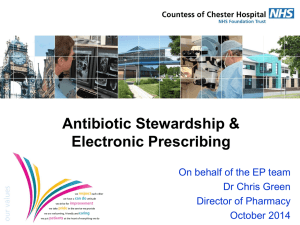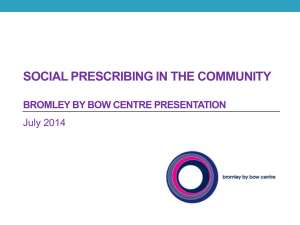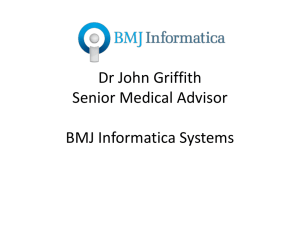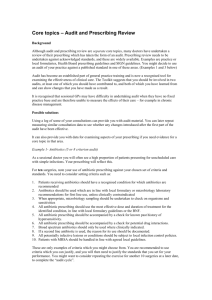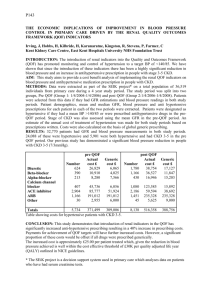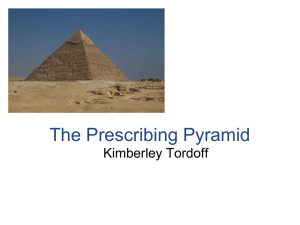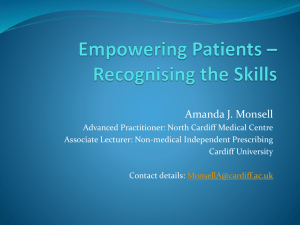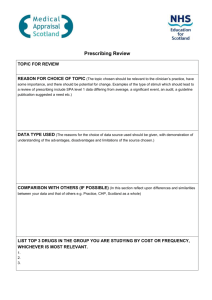Good clinical care
advertisement
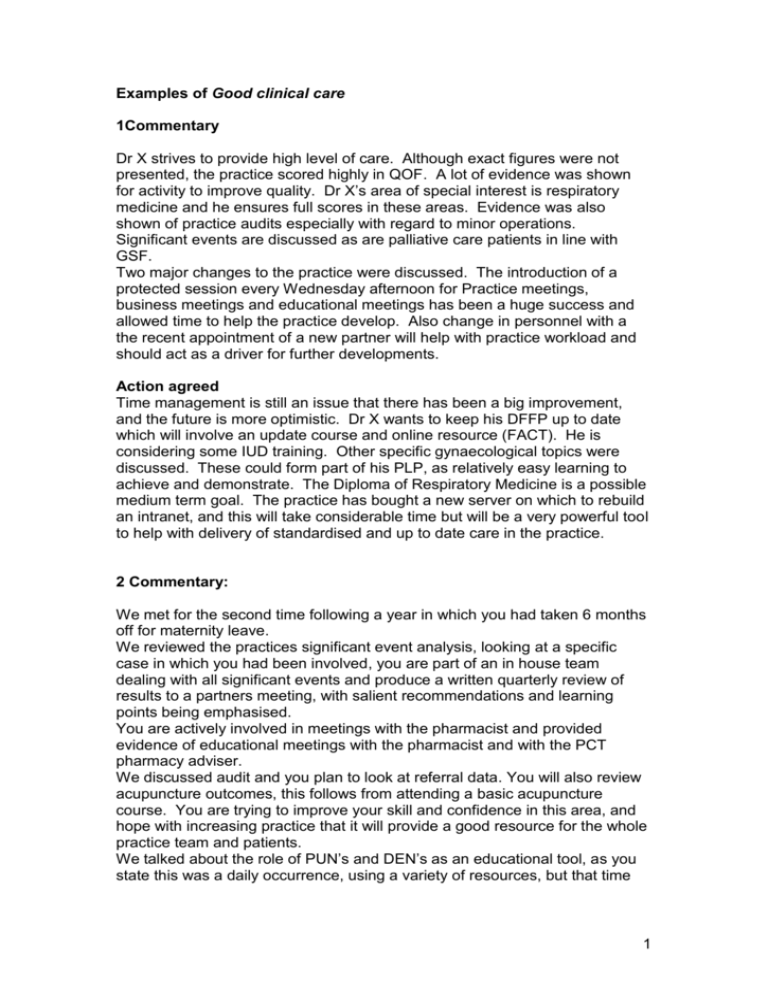
Examples of Good clinical care 1Commentary Dr X strives to provide high level of care. Although exact figures were not presented, the practice scored highly in QOF. A lot of evidence was shown for activity to improve quality. Dr X’s area of special interest is respiratory medicine and he ensures full scores in these areas. Evidence was also shown of practice audits especially with regard to minor operations. Significant events are discussed as are palliative care patients in line with GSF. Two major changes to the practice were discussed. The introduction of a protected session every Wednesday afternoon for Practice meetings, business meetings and educational meetings has been a huge success and allowed time to help the practice develop. Also change in personnel with a the recent appointment of a new partner will help with practice workload and should act as a driver for further developments. Action agreed Time management is still an issue that there has been a big improvement, and the future is more optimistic. Dr X wants to keep his DFFP up to date which will involve an update course and online resource (FACT). He is considering some IUD training. Other specific gynaecological topics were discussed. These could form part of his PLP, as relatively easy learning to achieve and demonstrate. The Diploma of Respiratory Medicine is a possible medium term goal. The practice has bought a new server on which to rebuild an intranet, and this will take considerable time but will be a very powerful tool to help with delivery of standardised and up to date care in the practice. 2 Commentary: We met for the second time following a year in which you had taken 6 months off for maternity leave. We reviewed the practices significant event analysis, looking at a specific case in which you had been involved, you are part of an in house team dealing with all significant events and produce a written quarterly review of results to a partners meeting, with salient recommendations and learning points being emphasised. You are actively involved in meetings with the pharmacist and provided evidence of educational meetings with the pharmacist and with the PCT pharmacy adviser. We discussed audit and you plan to look at referral data. You will also review acupuncture outcomes, this follows from attending a basic acupuncture course. You are trying to improve your skill and confidence in this area, and hope with increasing practice that it will provide a good resource for the whole practice team and patients. We talked about the role of PUN’s and DEN’s as an educational tool, as you state this was a daily occurrence, using a variety of resources, but that time 1 constraints prevented accurate recording. We agreed that it was appropriate to continue in this manner as it reflected you increasing workload elsewhere. QOF results are good and maintained at a high level, you have access to useful guidelines and computer templates which accurately reproduce data quality. We agreed that the mandatory areas of child protection and CPR needed to be included in your next PLP. We discussed the impact of proposed changes in working practice and extended hours, you felt resentment to a lack of choice and waste of NHS resource on something which is unproven in terms of patient benefit, and felt that the current level of workload intensity made it difficult to maintain a healthy work-life balance. Action agreed See PDP 3 Commentary This is his first NHS GP appraisal since qualification. Works 4 sessions/week in main post as a salaried doctor in multi-doctor GMS training practice. Practice have offered him 9 sessions, but he has agreed trial of 5. Also, several regular locum sessions/week and around 4-5 OOH shifts. He sees himself as a caring and conscientious doctor who is a good listener. A random selection of patients’ notes demonstrates excellent record keeping. Audit Has recently taken on responsibility for managing several areas of the mental health component of QOF. 80-97% points in these areas to date. Has a little knowledge of other audit activity within practice. Significant event (S/E) analysis Attends S/E meetings at W non-principals Group. Not sure if S/E meetings occur in practice. May occur on days when he is not there. Analysed critical incident with a colleague in a practice where he had worked as a locum. Guidelines/Protocols Has folder of in-house guidelines and accesses other NHS guidelines via “google”. Finds CEPPaC guidelines cumbersome to access, so rarely uses. Prescribing Not aware of any PCT prescribing targets/incentives for the practice. Complaints No complaints. Unsure of practice complaints procedure. No involvement in complaints meeting. The part-time nature of his work makes it difficult for him to be fully informed about practice activities. Receives minutes of business meetings, but rarely finds time to read them thoroughly. Action agreed 2 To perform an audit (probably of amidoarone prescribing.) To obtain forms and information about S/E meetings in practice. Aim to analyse at least one of his own events. To ascertain whether practice has PCT prescribing targets and if so to ask for details via minutes. Make use of the additional session from April 2008 to attend business meetings. 4 Commentary Works in an organised environment where protocols exist for a range of chronic diseases. There is use of SOPHIE protocols to aid computer entry and standardise care. The practice performs audit, and has a formulary which unfortunately will not run on the present system. It is a high QOF achiever. V is responsible for respiratory disease and has helped to develop the care given, and lead the PHCT. He is also responsible for child protection. The practice has benefited by moving into a new practice at Z and plans are afoot to move to a new premises in W in the medium term. PACT data was reviewed showing high generic prescribing, and there has been an increase in prescribing of ACE inhibitors and statins over the year. Atorvastatin is the highest cost drug and use of statins was discussed. V is very busy, and has made little progress in resolving the concerns about overrunning in surgery. Reflection revealed no ways to change his ‘style’ therefore it might be better to come to an acceptance of the status quo. V spends a lot of time on administrative tasks, using Saturday mornings as catch up time. Three areas were identified which were particularly burdensome: prescription queries; note summarising; dealing with path links. Action agreed Reflect on time spend in administration, to consider functional solutions to save doctors time. Progress may not be feasible. Maintain enthusiasm despite external pressures on work. Learning as in PDP 5 Commentary Z provides full generalist services in 9 sessions. He accepts his limitations as a generalist, but was concerned about whether he was up to date. He tried to ensure his learning over the last year focussed on areas of perceived weakness. He requested 360 degree feedback, and was encouraged by the results which demonstrate that his partners are confident about his abilities. The practice continues to run audits with pharmacy support and hold meetings for complaint and Significant Event Analysis Review. Z reflected on his personal significant event during the appraisal discussion and the learning from it. Z has personally reviewed his minor surgery patients and reflected on the results, which demonstrate that he is working within his competencies. He has learnt about musculoskeletal disease as planned in his PDP and implemented this in the practice by reviewing the practice’s polymyalgia patients and sharing the results with the practice team, to promote learning and improve patient care. 3 Z has continued to increase his abilities and confidence with I.T. and is now able to use the computer as an effective method of accessing learning. Agreed actions: To review prescribing habits and PACT data with the help of the Practice pharmacist To ensure essential training is up to date To target CVD in his personal learning To update on Paediatrics 6 Commentary: We discussed together today the role of significant event analysis as a learning tool. This year you have not raised any issues, but outcomes are regularly discussed at partners meetings, many of these involve human errors and it is difficult to know how to improve this area other than keep reminding people of protocols. You are involved in pharmacy reviews and educational meetings with the pharmacist, you have also developed work within the practice on simvastatin prescribing and PPI use. QOF continues to perform very well with overall achievement being well maintained despite political pressures! Areas of difficulty from last year including BP and CKD have improved with the sharpening up of guideline usage and you now feel more comfortable in these areas. We agreed that you need to update CPR skills and are looking for appropriate training which will cover your work at MIU too. You will also need to complete some child protection training and we discussed how this could be performed in house. You remain frustrated by 10 min appts and find it an added pressure trying to keep to time and catching up at the end of the session, rather than compromise patient care. We discussed how choose and book is an added impediment to time keeping and stress levels. Recent political pressures on extended hours have left you feeling frustrated and that GPs have been pushed into a corner. We reviewed your audit work on minor op outcomes and you felt it a useful exercise and plan to extend this year to review post op infection rates. Time remains your biggest issue and finding time to read adequately and keep up with guidelines can be difficult but your computer system offers useful prompts ensuring QOF targets are reached. You have identified some learning needs: dermatology, diabetes, contraception and sexual health. Agreed Action Child protection and CPR training Audit of minor op infection rates Meeting identified learning needs- see PDP 7 Commentary 4 Your roles continue in a very similar vein to last year, you have made the transition from PMS salaried to PMS independent, and over the year this has involved a considerable amount of meeting time, looking at contractual arrangements and preparing and developing QOF more actively. You anticipate QOF results will be good and you have been the main driving force within the practice to push this forward, your areas of special interest are epilepsy, CHD, CVA and Hypertension which are all on target to achieve maximum clinical points. We discussed that some areas were more difficult in particular depression screening and the appropriateness of the PHQ9 as a tool. You have spent considerable time in summarising notes and are currently at 70% but hope to achieve 80% By the end of March, coming from a starting point of 40-50% this is a considerable achievement. We discussed together medicines management, and defined the areas you had selected for improvement, you showed good evidence of ongoing audit into NSAID prescribing which has been your personal audit, but also as a practice of attendance at educational meetings with the pharmacist and audits into other areas. We reviewed the practice prescribing data and spoke about the impact that a high prescribing partner has upon this, and measures which you have used to tray and address this. You presented 3 SRT’s with good evidence of significant event and case review, and you felt that this was a better learning tool than PUN’s and DEN’s which you had not found a satisfactory way to record your reflections and learning points. Diabetes was an area where you felt you had some learning needs to address over the next year. Results of significant event reviews are communicated at practice meetings every 8 weeks. You had good evidence of involvement in GSF and LCP in your portfolio. Certificates of attendance at mandatory training events in CPR and Child protection were reviewed. I commented that your portfolio of evidence was clear and well organised. You remain constrained by the time pressures and external influences such as QOF targets and PMS changeover have had a huge impact on time this year, hopefully this will improve. Actions agreed Ongoing review of prescribing with audit of some medication use Address diabetes particularly diabetic nephropathy, interpretation of HbA1c, and use of oral medication. This could be done either by use of an external speaker for in house teaching or using on line resources or appropriate course. Continued recording of learning with SRTs 8 Commentary She has worked full time as a partner in a multi-doctor practice for almost 12 years. Of the four partners, she has taken on the central role in ensuring 5 systems and protocols are in place to provide ongoing structured chronic disease management and good clinical care. She holds the Cardiff diploma of Practical dermatology, and is delighted to have developed her services to patients through a monthly in-house dermatology clinic. Audit Holds significant responsibility for clinical domains within QOF. Her efforts are reflected in the practice achievement of 98% of total points. She has developed a proforma to facilitate dementia annual review. Practice audits include anti-obesity drug prescribing. Uncharacteristically low QOF score for CKD (70%) was discussed. Precribing She is the prescribing lead for the practice. Participates in Prescribing Leads meetings every 4 months. Reviews PACT data and Top 20 drugs quarterly. Prescribing analyses show costs 8% below PCT equivalent. She has acted upon key recommendations of PCT prescribing advisor following annual review – e.g. updating repeat medication after hospital discharge, 1st line anti-hypertensives, aspirin in diabetics. Also reviewed 28 day prescribing of CD’s, repeat prescribing of diclofenac and patients’ use of hypnotics/anxiolytics. Guidelines/Protocols Strives to follow local and national clinical guidelines. She has developed a practice protocol for updating repeat medication after hospital discharge following detailed prescribing assessment. Significant Event (S/E)Analysis Participates in monthly S/E meetings with multidisciplinary team within QUEST, via Gold Standards meetings very 3 weeks, and at quarterly Clinical Governance Leads meeting. Completed S/E forms in portfolio. Complaints Practice complaints procedure in place. No personal complaints since last appraisal. No formal complaints against practice for over 1 year. Other monitoring material Practice has detailed referral analysis through PBC, reflection on gynaecology referral data prompted her to refresh skills in pipelle biopsy. Action agreed Maintain expertise in dermatology with continued learning Review the care of patients with CKD Document planned learning from PDP 9 Commentary Working 3 sessions a week in rural practice for last 5 years. Provides all medical services except surgical procedures. No out of hours work. Feels the practice provided a good solid base of clinical care but lacks ambition. Achieves QoF targets. Regular significant event audits some of which have led to useful policy changes and learning. Referrals reviews between clinicians also lead to learning and improving patient care. 6 On a personal level she has audited own referrals and found them to be appropriate. Tends to see chronically ill and mental health patients, few men although she sees same day acute problems. Feels at risk of becoming deskilled in men’s health. Practice has consciously decided not to record depression indicator scores as not shown to be useful and detract from consultation. Not using templates for data recording as not user friendly (old computer system) and detract from consultation. Action agreed New computer system this year Will repeat audit of referrals and perhaps separate audit of emergency referrals. Try to persuade practice to go for an away day to motivate team to think of clinical and other targets. Cervical smear training update CPR training 10 Commentary. Work in the practice is essentially unchanged since last year’s appraisal. The practice is preparing to move to new purpose built premises at some distance from their existing premises. Much greater breath of documentation provided for this appraisal. 1. Audits. All QOF data with high achievement levels. Initiated for the audit for hypertensive patients that hadn’t been seen. Personal audit of all his own referrals over 3 month period with comments on appropriateness after checking outcomes. 2. PACT data supplied showing below PCT average prescribing costs, and summaries of meetings with pharmacy advisor. 3. Significant events - summaries & learning points from meetings held to review 4. Practice protocols – examples including assessments, management of conditions, prescribing & a cardiac arrest on the premises protocol. Reflecting on the past five year, he feels there have been significant improvements overall – that their clinical care has been better organised and more systematic; they have more and better trained staff including a nurse practitioner seeing patients with minor illness. The help from a pharmacy advisor has meant that their prescribing more closely follows local guidelines. He has some concerns that some aspects of nGMS can lead to reduced continuity of personal care. Action agreed Review these same 4 areas next year having moved to new premises. Ongoing learning as in PDP 7
